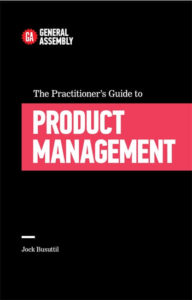
PRODUCTHEAD: Pragmatism is (im)perfectly fine
PRODUCTHEAD is a regular newsletter of product management goodness,
curated by Jock Busuttil.
product by product (caribou rmx) #
every PRODUCTHEAD edition is online for you to refer back to
tl;dr
There are 3 reasons why a discovery should end:
- It is purely performative
- Ignored / unknown context
- Unconnected to value
Everything on your product roadmap should have lots of context that is easy to find
hello
By serendipity, two lovely people I have worked with in the past in UK government have both published articles this week that talk about being pragmatic with product management in different ways.
Tom Dolan, who amongst other things has been head of product at Government Digital Service (GDS), shares some thoughts-in-progress about how product roadmapping could change. He doesn’t throw out all received wisdom, but rather shares his view on when you do need to make compromises from the Platonic ideal of a roadmap simply to make it work in your own organisation.
Scott Colfer, who worked as head of product at the Ministry of Justice and at Westminster council, has also shared some of his reflections on product discovery. He has the benefit of having observed dozens of product discoveries during his time in government and can therefore provide objective advice on what tends to make them work better and worse, and what you can do about it.
There are a couple of things that both articles have in common: product leaders need to share context generously, and be comfortable about when and how much to diverge from the prescribed ‘right’ way of doing something.
Both stress how important it is for the product leader to share the right amount of context with the team to give them the best possible chance of success. (Pro tip: it’s almost always better to over-share.) It could be context about the internal machinations of the organisation that helps a product discovery work better, or the context about the overarching product strategy that makes a roadmap able to focus more on what the organisation also sees as the highest priorities.
The other thing they have in common is that sometimes you just have to be pragmatic about what you’re doing. There’s no point in continuing to slog through a discovery if it’s not helping the team to decide whether to continue or stop with the opportunity. Similarly, sometimes there will need to be hard deadlines on your no-dates roadmap (now / next / later) — real ones, not ones made up to give your team artificial urgency — that would affect the order in which your team decides to sequence their work.
Enjoy the articles!
Speak to you soon,
Jock
what to think about this week
Do the right thing: invest in the right opportunities by doing discovery right
We had a central fund that covered the costs of making time to understand problems for our service users before deciding if and how to apply for a grant. We called this ‘Lean Discovery’ and it was powerful. We explored 5 grants over 6-months. Normally we’d apply for a modest amount from all 5 but this time we discounted ourselves from 3 of them.
We won more money in those two than we would’ve done if we’d won all 5 at our normal bid amount. Saying ‘no’ to the wrong opportunities helped win the right opportunities, and win big.
Be ruthless with opportunities
[Scott Colfer]
Tom’s roadmap heuristics – a work in progress
I’ve previously trailed a massive blogpost-that-might-be-a-book about roadmapping, but I suspect it’ll never get finished enough. However, earlier this week I was at a chat about the future of Product Craft within government, and mid-discussion spontaneously reeled off a list of my top reckons on the subject. Given that I had managed to do it on the fly without much thought, I decided to have another go – using largely the same scrappy approach.
Roadmapping is more important than an actual roadmap
[Tom Dolan / LeaningForward]
recent posts
Getting your first job as a product manager
Job adverts present a chicken-and-egg problem: they all need you to have product management experience to secure a job, but you don’t yet have a product management job to gain that experience.
Don’t let this discourage you!
Practical tips for breaking into a career in product management
[I Manage Products]
Force multipliers
Recently I was explaining to a client why I focus my efforts on finding “force multipliers”. These are what I call activities that allow us to extract multiple benefits from a single piece of work. You could think of it a little like a workplace fusion reaction, where the output ends up far greater than the input effort.
Getting more out than you put in
[I Manage Products]
How to sharpen up your vision and strategy
When the vision and strategy are focused and clear, they allow product managers to prioritise and filter the possible options for their products more easily.
Use these straightforward questions and worked examples
[I Manage Products]
can we help you?
Product People is a product management services company. We can help you through consultancy, training and coaching. Just contact us if you need our help!
Helping people build better products, more successfully, since 2012.
PRODUCTHEAD is a newsletter for product people of all varieties, and is lovingly crafted from a surprisingly straightforward scarf joint.


Leave a Reply